

Is Candyman real?
Well, no. Obviously. He's a movie character. However, within the context of his own movies is he actually real - some kind of dream demon/bogeyman figure with a tragic backstory rooted in American racial injustice? Or is he the projection of an unwell mind, an urban legend brought to life by an anthropologist who loses her hold on reality?
Spoiler, the two sequels - 1995's Candyman 2: Farewell to the Flesh and 1999's Candyman 3: Day of the Dead - dispense with all of that psychological handwringing and lean hard into slasher conventions. Candyman - the hook-handed menace played so memorably by Tony Todd - hacks his way through anyone who dares call him forth. However, the storytelling in slasher franchises is usually at its most interesting at the very beginning, and Candyman is no exception.
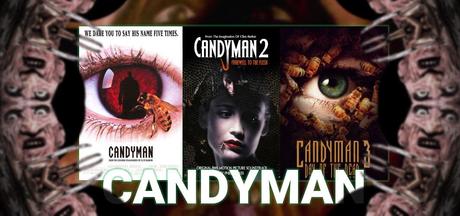
Adapted from Clive Barker "The Forbidden," directed by Bernard Rose as if it was a gothic horror film, and scored quite memorably by Philip Glass, 1992's Candyman is a surprisingly sophisticated story about race, privilege, sanity, and urban decay. Rose films everything in such a way that until literally the very end we don't know if Candyman is real or if Virginia Madsen's heroine has lost her mind, but we know the backstory about a black man being lynched for loving a white woman is all too real in American history. That alone gives Candyman an added dramatic weight. However, for everything that makes Candyman great it has some inherently problematic elements which will surely be ironed out in Jordan Peele's 2020 "spiritual sequel."
What's It About?
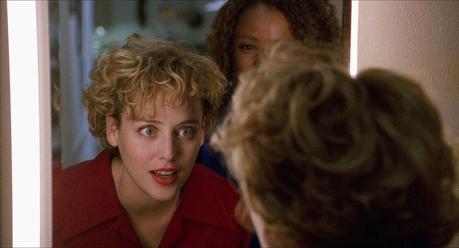
Helen Lyle (Virginia Madsen) - a young, white grad student in Chicago - has ambitions of burying her older male colleagues, including her possibly unfaithful husband, by going to places they'd be too scared to follow. She stumbles upon an urban legend about a hook-handed figure who can be summoned if you say his name into the mirror five times. Flaunting superstition, she says the name five times and nothing happens.
At first.
The students on campus tell Helen a story about a white babysitter who did the same thing, except as she soon as she turned out the lights Candyman appeared and mutilated her. The university's black janitorial staff already knows all it about it, though. Candyman has been killing young black folk in the city's dreaded Cabrini-Green public housing ghetto for years, and no one seems to care. Helen sees that as the opening to make a name for herself and plunges headlong into danger to get the story for her thesis, much to her black colleague's dismay.
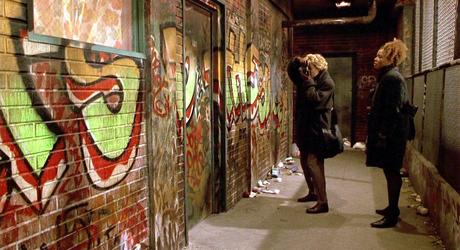
Soon thereafter, she learns the full legend: Candyman was a black artist who committed the deadly sin of falling in love with a white woman. A lynch mob saw him to his brutal end, including cutting off his left hand and shoving a hook into his bloody stump. Now, he haunts the Cabrini-Green since it sits on the spot where he died.
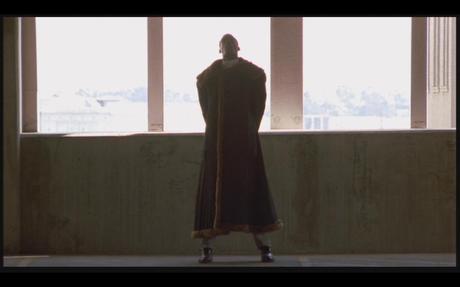
Helen's life quickly unravels after that. Candyman - whose deep, baritone voice has an odd, hypnotic effect (to pull that off, they legit hypnotized Virginia Madsen on set) - appears to frame her for a series of murders. Or does he?
Why I Watched It
Never seen it, always wanted to, it was playing at a local horror film festival, and with Jordan Peele's new take due next year it was finally time for me to watch the original. Plus, after Shudder's Horror Noire documentary I had a new appreciation for Candyman 's historical significance.
What Makes It Problematic?
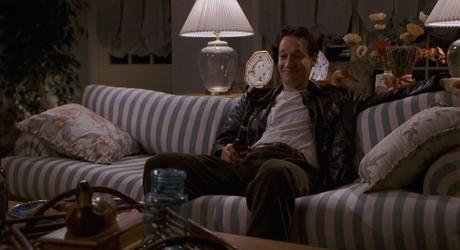
That they cast Ted Raimi to play a motorcycle-riding bad boy who seduces the hot babysitter in a flashback. Ted Raimi? Really?
No, Seriously.
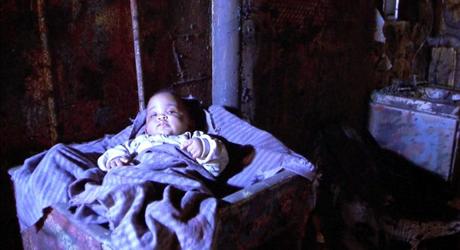
I can't take credit for this particular take. It just happens to be one I agree with:
In Shudder's wonderful Horror Noire documentary, the various talking heads, including Jordan Peele, all praise Candyman and highlight just how much it meant to them to finally have their own black Freddy Kreuger. Indeed, even as Bernard Rose and his crew were making the movie everyone was so aware of the significance of a black slasher villain that the NAACP demanded to see the script. Virginia Madsen was quoted at the time as being worried how black audiences were going to react. "I don't think Spike Lee is going to like this film," she told the Chicago Tribune.
Black filmmaker Carl Franklin certainly didn't like it. In the same Chicago Tribune piece, he argued, "'There`s no question that this film plays on white middle-class fears of black people. It unabashedly uses racial stereotypes and destructive myths to create shock. I found it hokey and unsettling. It didn`t work for me because I don`t share those fears, buy into those myths."
This viewpoint is echoed in Horror Noire.
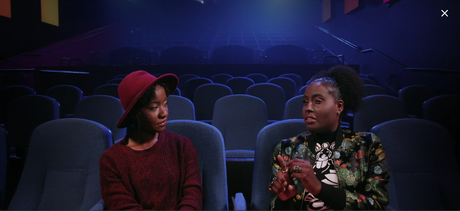 "I don't think that character would go after poor black people. This is where you can tell that Candyman came from the mind of a white person" - Monica Suriyage
"I don't think that character would go after poor black people. This is where you can tell that Candyman came from the mind of a white person" - Monica Suriyage She's not wrong. Candyman is ultimately the product of two British white men. Clive Barker set "The Forbidden" in the slums of Liverpool as an intended commentary on the British class system. Bernard Rose's script moved the action to urban America to add a racial element to the commentary. In 2015, he explained his reasoning:
"The fear of the urban housing project, it seemed to me, was actually totally irrational because you couldn't really be in that much danger. Yes, there was crime there, but people were actually afraid of driving past it [...] It's sort of a kind of fear that's at the heart of modern cities, and obviously, it's racially motivated, but more than that-it's poverty motivated."
In the context of the film, however, Rose doesn't seem to fully grasp the disconnect between a black victim of white lynch mob justice coming back as a supernatural phantom and visiting terror on poor black people. Candyman only occasionally goes after those whites whose ancestors might have been more responsible for his death. His stated reasoning?
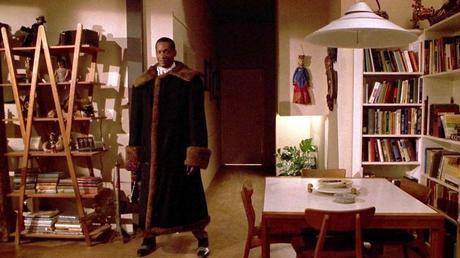 "I am the writing on the wall, the whisper in the classroom. Without these things, I am nothing. So now, I must shed innocent blood. Come with me." - Yes, as a Clive Barker creation he does kind of talk like Pinhead
"I am the writing on the wall, the whisper in the classroom. Without these things, I am nothing. So now, I must shed innocent blood. Come with me." - Yes, as a Clive Barker creation he does kind of talk like Pinhead
His power stems from his ability to instill fear and be remembered, making him quite truly the embodiment of an urban legend. However, the racial politics at play are trickier than the script realizes.
Or are they?
The Ringer's Manuela Lazic had a different take, arguing that Candyman's shedding of innocent blood is necessary since his true goal is to break down Helen's academic empathy for his plight and truly make her feel what it was like to be him. For a good chunk of the film, she walks right up to the line of fulfilling a white savior narrative, and as soon as she does Candyman pushes back on her so hard that she loses grasp of time and the ability to tell the difference between fantasy and reality. It's more than that, though.
[Candyman] is not framing Helen for his horrendous crimes simply to bring her down and prevent her investigation; his goal, rather, is to make her feel the degree of his own pain as a black man denied love and life. Ostracized by her husband, left without any friends, and institutionalized, Helen is utterly alone and reviled by all. On top of her natural empathy for Candyman's own suffering, she now understands his anger and despair more than she ever thought possible.
Candyman, in his own way, is seducing Helen to the afterlife in the hopes that she will become a part of the urban legend and live on with him in infamy. He is driven to this this because she resembles the white woman he loved in life. The frustration is that this repeats the old King Kong trope of the black monster and the blonde white woman, and the seduction involves the senseless mutilation of poor black people, including children, who suffered the misfortune of simply being born in the wrong place.
Did I Like It?
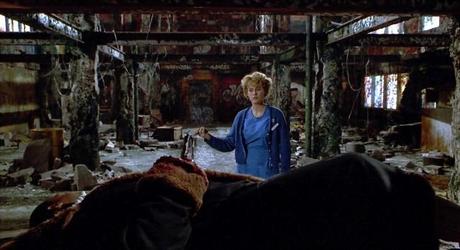
We tend to cluster our slasher icons together as if their movies were all the same, but they're not. Candyman, for example, has almost nothing in common with Friday the 13th or Halloween. None of the characters are teenagers, director Bernard Herman's influences appear rooted more in gothic ghost stories than exploitation blood-letters, and the story packs a fascinating allegorical punch.
So often horror movies have to address the question the audience is shouting at the screen: why doesn't someone just call the cops? In Candyman, there's no need to call the cops; they wouldn't show up anyway. They don't go to Cabrini-Green. That's a surprising amount of "real" for a 1992 slasher.
Candyman, however, is also a sometimes confusing and slightly problematic movie. I'm ultimately more impressed by it than troubled. It's kind of like the Three Billboards Outside Ebbing, Missouri of urban-set slasher films in that it shines a light on American racism but it does so from a clearly outsider's perspective. Still, Rose's direction is often masterful. I particularly love his use of a film noirish close-up on Helen's face when she first hears Candyman's tragic backstory. Philip Glass' score is brilliantly operatic. Madsen and Todd are fully committed and forever memorable.
As a story about race, there is room for improvement. I trust Jordan Peele's new version will nail that down. However, as a feat of filmmaking, Candyman won't be topped so easily.
Did It Scare Me?
There are several legit jump scares in this film and some of the imagery is quite disturbing, yet what probably scared me the most was this:
Are those real bees? Nope. No thank you. Can't deal with it.
Where to Stream
According to JustWatch: Currently, you are able to watch "Candyman" streaming on Netflix. It is also possible to buy "Candyman" on PlayStation, Vudu, Apple iTunes, Microsoft Store, Redbox as download or rent it on Vudu, Apple iTunes, Microsoft Store, Redbox online.
31 Days of Halloween So Far:Next Up: Zombies meet blaxploitation

